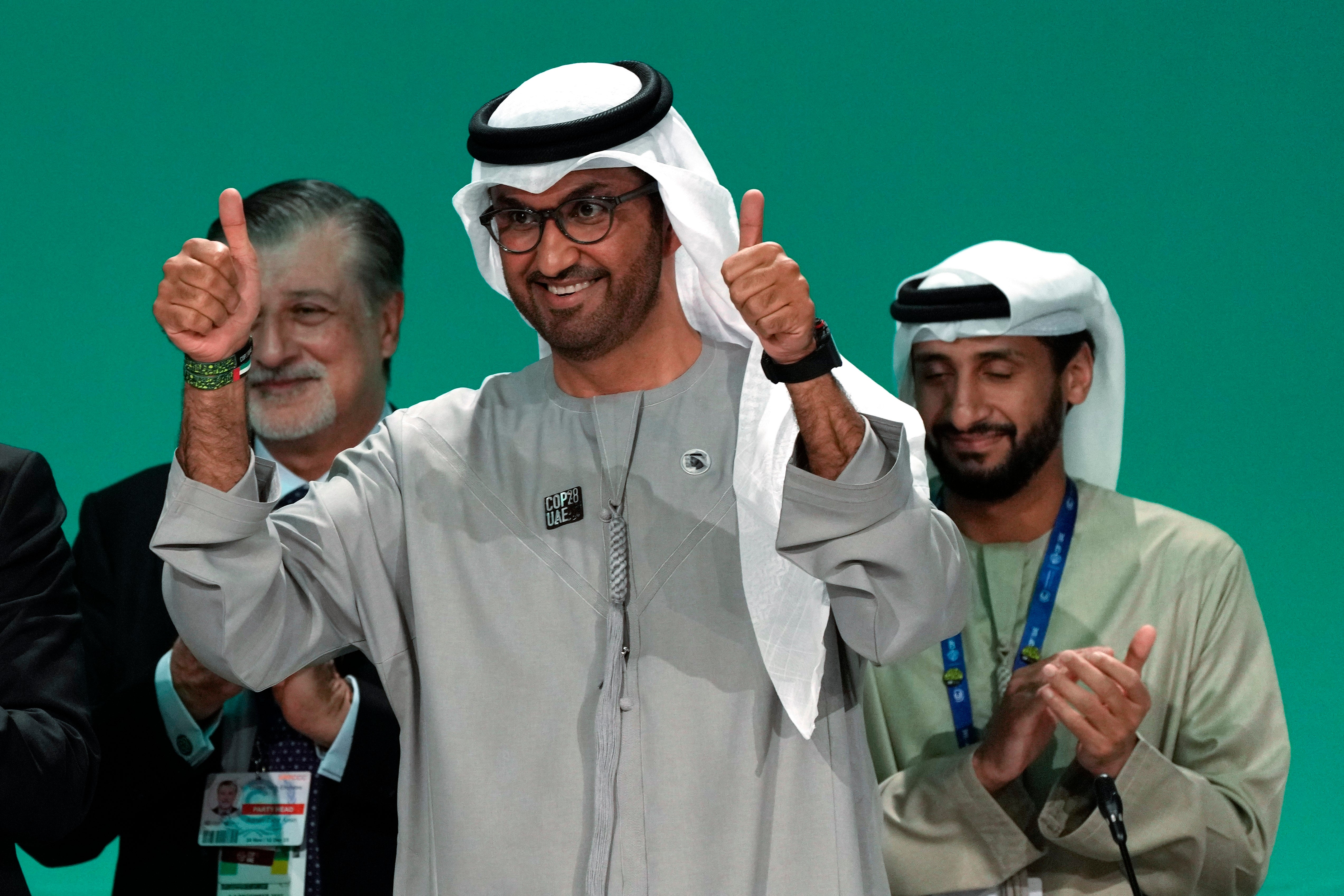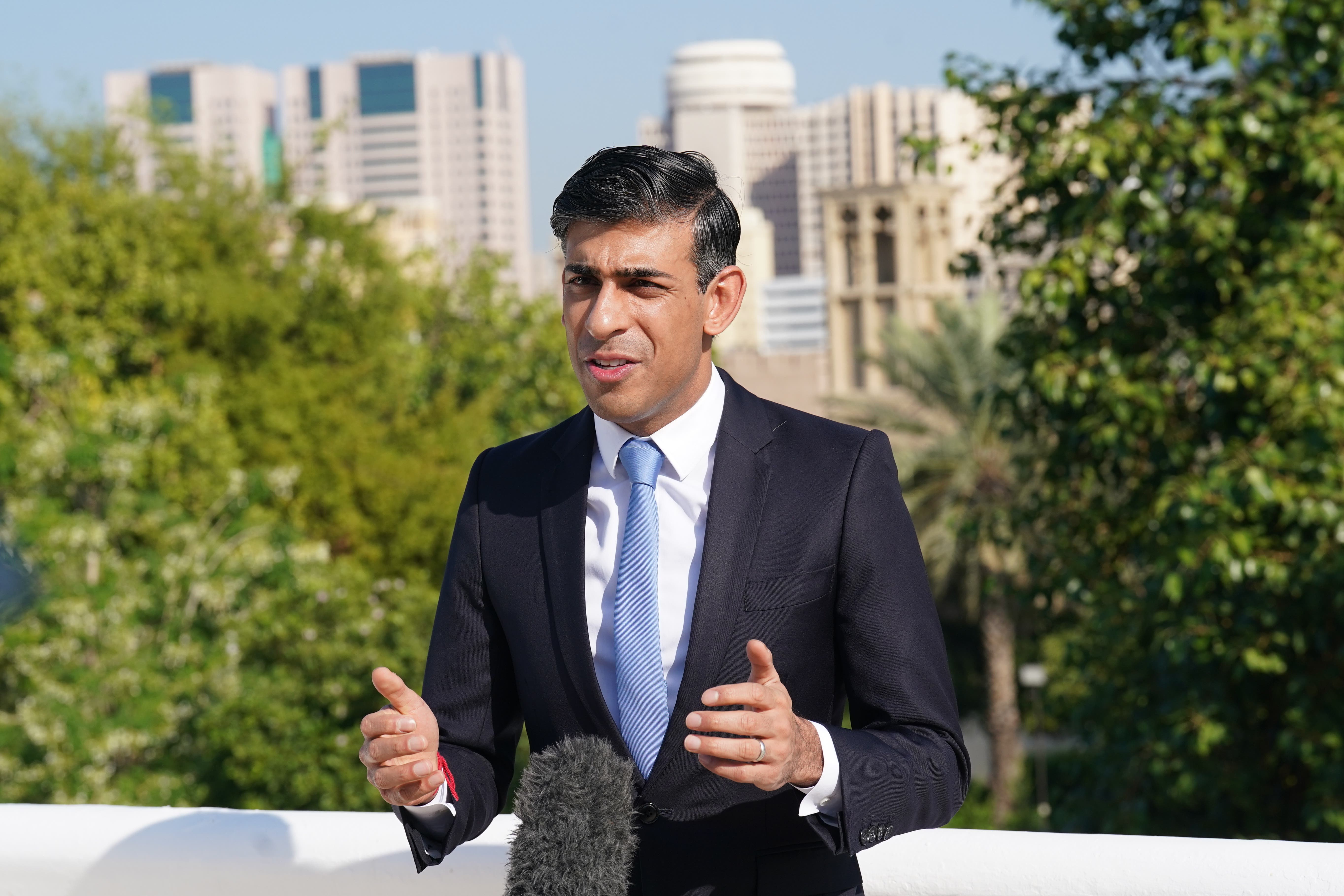The UK and US are climate hypocrites – why do we expect oil states to be any better?
The climate summit saw some important people make some big promises, writes climate expert Roger Harrabin. But a closer reading shows that Big Oil still controls the field when it comes to climate change


Cop28 in Dubai closed in an explosion of tears, hugs and applause from exhausted and emotionally drained delegates and media. Not long beforehand they’d been cast down at the absence of fossil fuel promises in the draft text. Now the same Emirati oil man, the towering Sultan al Jaber, uplifted them with an agreement appearing to signal the end of the fossil fuel era. Were their emotions played just a little? It’s impossible to tell, although it certainly was a remarkable and unexpected agreement which probably couldn’t have been forged outside a fossil fuel nation.
But will this historic agreement keep us within the 1.5C temperature rise guardrail? Will it adequately help poorer countries adapt to climate change, cope with disasters and obtain clean energy? Does it herald the end of the fossil fuel era? No, to all of the above. Jim Skea, head of the science panel IPCC, gave me his headline reaction: “One hundred and ninety-eight countries agree transition away from fossil fuels… at some point in future.”
The geologist Prof Bill McGuire added: “What we needed was a binding roadmap to cutting emissions almost in half within 72 months but ended up with scraps. Climate appeasement wins out again, and the fossil fuel corporations will be popping the champagne corks.”
Indeed, the fingerprints of the hydrocarbon lobby were clearly visible. Take the text on fossil fuels: the paragraph “recognises the need for transitioning away from fossil fuels in energy systems, in a just, orderly and equitable manner, accelerating action in this critical decade, so as to achieve net zero by 2050 in keeping with the science.”
At first reading, this looks like an initiative to transform whole economies but watch out for the small clause “in energy systems” clearly inserted by the previously panicked Opec oil cartel. These three words limit the agreement to the electricity sector, where a tiny fraction of power comes from burning oil.
That leaves the petrostates free to pour their black gold into cars, trucks, boats and planes. We must choke off demand, not pray for a fall in supply. If you doubt the Saudis’ intention to expand production, hear energy minister Prince Abdulaziz bin Salman: “I think these texts do not affect our exports, do not affect our ability to sell,” he reassured Saudi-owned Al Arabiya television. Did he not realise his words would be translated, or did he simply not care?
Either way, his expectation is clear – and unlike most of my colleagues in the environment corps I have some sympathy with the Saudis’ situation. They know the UK burnt its coal to fuel the Industrial Revolution, then cashed its North Sea drilling bonanza; they now see Rishi Sunak scrabbling for the last drops of oil, while insisting that other petrostates lock their riches underground for the benefit of humanity. They see this as stinking hypocrisy, so let’s not be surprised at that flagrant get-out clause.

Veteran Cop-watcher Michael Jacobs argues that such “creative ambiguities” in the text are inevitable as nations with opposing priorities are bent towards each other in the quest for consensus. He says this battle must be fought later. But the climate needs the transport sector to switch to electricity urgently – in parallel with the energy sector.
After the Opec get-out, here’s what we might call the Putin get-out. During Cop, he flew to Abu Dhabi to lean on the conference from a distance. While more forward-looking states such as the UAE and even Saudi Arabia have already begun to diversify their economies with investment in renewables, Putin’s options are more limited.
A clause thrust into the text “recognises that transitional fuels can play a role in facilitating the energy transition”. That’s Russian for “keep burning natural gas”.
The idea of gas as a transitional fuel between coal and renewables has been promoted in recent years by gas firms anxious to seize the electricity generation market. Certainly, gas power stations look much cleaner than coal’s filthy smokestacks but the industry leaks huge quantities of methane – a planet-heating gas 80 times more powerful in the short term than CO2.
The Dubai document aims to clamp down on so-called “fugitive emissions” but it ignores advice from the International Energy Agency that no new fossil fuels should be sought at all.
Indeed, the oil and gas firm run by the president of Cop28, the Abu Dhabi National Oil Company, is investing $150bn in developing more oil and gas fields, making a mockery of his Cop triumph.
The Putin gas-getout clause is great news for all gas producers, including the USA and even the UK.
The Russians were accused of hampering progress at Cop as usual. And it’s no accident that after Putin vetoed other Eastern European nations to stage next year’s Cop, the world’s most important climate event will be hosted by yet another oil producer – Azerbaijan. Like all such deals in the Cop process, the Dubai agreement is not set in stone. Resolutions can go back as well as forward, and the deal may creak next year if Putin guides the hand that wields the gavel.
The role of the USA fell under the spotlight in Dubai, too. The remarkable climate campaigner Senator John Kerry urged a strong deal, while his president invests massively in clean tech whilst also pursuing plans to retain US dominance of the global oil and gas market.
It’s clear that most governments are incapable or unwilling to make the urgent changes needed to prevent dangerous climate change. Remember that, despite all the sleep-deprived euphoria, this agreement guarantees very little. It contains a welcome plan to triple renewables and double energy-saving (always the Cinderella option as politicians and businesses typically prefer expansion rather than contraction.) But the IEA warned that the deal on the Cop table would deliver only 30 per cent of what’s needed to hold temperatures to a rise of 1.5C above pre-industrial times – and that’s assuming that leaders keep their promises, which few have managed so far.
Already nations such as the UK, a long-term leader – have eased off when it comes to the climate – not just by consenting to new fossil fuel exploration but also by delaying the advent of electric vehicles and removing rules requiring landlords to make homes habitable for poor families. If the wealthy UK says it can’t afford its own laws on global heating, what chance have the others?
And don’t forget the dread hand of Big Oil with its so-called think tanks, which will continue to pour disinformation into the right-wing media. Every sceptic victory will be magnified as it flies around the internet, scattering seeds of disquiet. A UK minister told me that Sunak’s recent U-turn on climate rhetoric was “good politics” because it barely changed policy and “got the Express off our back”. This gives a hint of the fragility of the Dubai agreement because Big Oil will never surrender.
Does this mean the Cop accord was useless? Certainly not. The inclusion of the totemic phrase “fossil fuels” is a step in the right direction, although it’s a statement of the obvious that should have been made decades ago.
Then, take the loss and damage agreement to compensate poor nations for extreme weather events exacerbated by climate change they haven’t created.
The new fund is welcome but it’s a fraction of what’s needed, and we mustn’t call it “compensation” because the Americans fear that implies legal responsibility for the climate damage that made them rich.
There was good news, too, when the USA agreed to shift away from coal, although it’s a trend happening anyway. Also, the strong language defining the climate problem in Cop proves that the world’s governments do now collectively acknowledge the scale of their problem.
These paragraphs are plangent: “The document expresses serious concern … that 2023 is set to be the warmest year on record and that impacts from climate change are rapidly accelerating, and emphasises the need for urgent action and support to keep the 1.5C goal within reach … in this critical decade;
“That human activities, principally through emissions of greenhouse gases, have unequivocally caused global warming of about 1.1C. That human-caused climate change impacts are already being felt in every region across the globe, with those who have contributed the least to climate change being most vulnerable to the impacts.”
Analysts including Johan Rockstrom, director of Germany’s PIK-Climate, and James Murray from BusinessGreen magazine believe the Cop’s messages are so strong that investors, banks and governments will push financial flows in a direction that protects the climate. With the cost of renewables tumbling and the risk to investors of stranded assets in carbon-heavy resources, they may be right… but the crucial question is the timescale. We need urgent cuts in greenhouse gases right now.
“Victim” nations such as the small island states also applaud the sentiments of Cop but fear they will not suffice to cut emissions in time to avoid overshooting 1.5C, or unlock funds needed to adapt to a hotter world, or gain their own clean energy.
Behind the debate, it’s becoming clear that 1.5C is not a safe level of warming in any case. The world has suffered unprecedented weather and temperature extremes and severe loss of ice with an official temperature rise of 1.1-1.2C (although some scientists argue that’s an understatement). Scientists studying icy regions say the rapid heating of the Arctic is already provoking weather chaos across the globe. The cryosphere needs urgent global attention but received a one-word mention in the report.
Professor Sir Brian Hoskins told me that Cop28 leaves “a huge and probably impossible gap between the language of keeping to the Paris 1.5 target and the actions that countries are making or promising to make. Before Cop30 in Brazil, the countries will have to come up with their new [commitments] but by then, it could be even more evident than now that the global temperature rise will inevitably exceed 1.5C.”
Professor Jim Skea, head of the Intergovernmental Panel on Climate Change, said scientists have been blindsided by recent extremes, especially by ocean heating – which, he said, was beyond the imaginings of climate modellers. What about the outcome of Cop28? “The proof of the pudding will be in the eating. Will governments do what they need to do? I’m not sure this Cop makes much difference.”
Roger Harrabin is a fellow of St Catharine’s College, Cambridge, and a former correspondent for the BBC






Join our commenting forum
Join thought-provoking conversations, follow other Independent readers and see their replies
Comments